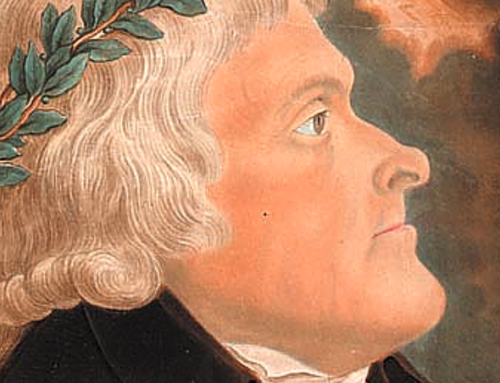“Different times,” he intoned, “demand different actions,” and Dr. Kirk lit another cigar from his seat on the passenger’s side of the college Buick. “Had I been born in Ancient Egypt,” he ruminated, “I may well have agitated for change, even radical change. But modern times require shoring up the Old Moral Order. They compel us to preserve our traditions as best we can.”
Russell Kirk’s observation was a kind of a riddle, touching upon the heart of what it means to be a true conservative.
My part-time student job of ferrying him from Hillsdale College to his ancestral home in Mecosta was an amazing stroke of luck, and I would gladly have paid for the privilege and the pleasure of spending so many hours with him. I no longer remember my question, but my recollection of his answer seems as clear now as it was surprising to me then.
Amenhotep Kirk? A radical reformer of Ancient Egypt’s Middle Kingdom? The scourge of priests and pharaohs? It was hard to imagine, coming from the father of modern American conservatism. Was he only a conservative because that’s what we need now? Was not everything in which we believed intrinsically Western, fundamentally Christian and hardly Ancient Egyptian?
Of course not, for at least two related reasons. First off, if a conservative reverts again and again to the same list of pre-printed strategies, to the same coach’s old playbook, then he is probably an ideologue and not a true conservative at all. We Hillsdale students had recently seen Dr. Kirk lose a debate on this topic; it galled a few of us but our champion took it with characteristic aplomb.
Dr. Eric Maria Ritter von Kuehnelt-Leddihn, a charming Austrian fluent in innumerable languages but a man of the Middle-European Old Right, had argued that the West needed a constructive ideology in order to combat the socialist/communist and materialist/atheist ideology of the seemingly unstoppable Left. We needed slogans that could be easily affixed to banners, stirring mission-statements in pamphlets, and the rest of the ideological trappings that made faith and culture easily digestible, memorable and motivational. Despite his oldie-worldie packaging (that seemed so attractively exotic in our Mid-Western cornfields) the elderly Habsburgian gent was an early spin-doctor, with a Booster’s activist agenda that appealed innately to young anti-communist fire-eaters and the rich “big butter-and-egg men” who financed such things then and now.
Dr. Kirk’s position was that conservatism is antithetical to ideology in any form; build one of your own and it will enslave you. An ideology will constrict your ability to make social, cultural and political prescription. Instead of a right-wing version of Mao’s “Little Red Book” or Ghaddafy’s green one, or even Ayn Rand’s Objectivist handcuffs, a conservative needs a hard-earned and wide-ranging body of knowledge and faith, culture and history, expert interpretation and reason from which to puzzle out the way forward – just as a good physician needs as big a pharmacopeia as possible. Reason alone was a bad master, but reasoning out of any little ideological tract was (in my words, not his) a self-induced lobotomy.
Poor Dr. Kirk lacked the exotic accent, the affectation and most importantly the trendy modern zip and dynamism of hardball mass-marketing. Moreover his prescription required study over a lifetime and generations to follow; it could not be administered successfully in one simple dose, nor could it be packaged in a colourful hamburger-wrapper. Indeed, oversimplification was the very foundation of error. By the time that he loaded up his mental suitcase with the wisdom of Jerusalem and Athens, Rome and London and Philadelphia, there was no room left for a stack of cheap bumper-stickers, nor would he have touched them. So he lost the popular vote.
Dr. Kirk’s point was partly the prescriptive nature of a conservative, using many old and trusted tools, plus reason, to solve modern problems. A conservative is neither an accountant nor a mechanic who looks up the answer in a book; she is closer to an orchestral composer with many instruments or a landscape painter with an infinite range of colours from which to choose the best and most appropriate. A conservative’s tool-box contains what Burke called “the bank and capital of nations and ages” which must be invested selectively to address problems that are never quite the same. In this sense, conservatism is primarily an attitude and a methodology.
Ancient Egypt’s version of Kirk would not have enjoyed the same cultural resources from which the Sage of Mecosta chose in twentieth-century America. But there would have existed a complex religion, a body of Egyptian law, folk wisdom and tradition, story and proverb, physical culture such as in architecture, and a history of scholarly interpretation, altogether plenty rich enough to enable prescription.
 Paradoxically perhaps, it is Amenhotep Kirk’s conservative methodology that may have led him to espouse radical change in Old Egypt, which is what Russell Kirk implied in his remark to me. If in his modern American and Ancient Egyptian incarnations Kirk remained consistent in his belief in prescription, his conservative predilections and in his prescriptive strategy, he could have justified preservation today and dramatic reform ages ago.
Paradoxically perhaps, it is Amenhotep Kirk’s conservative methodology that may have led him to espouse radical change in Old Egypt, which is what Russell Kirk implied in his remark to me. If in his modern American and Ancient Egyptian incarnations Kirk remained consistent in his belief in prescription, his conservative predilections and in his prescriptive strategy, he could have justified preservation today and dramatic reform ages ago.
But is this not a contradiction? Does it not mean everything and thus nothing? If a conservative can be constant and yet radical where is the dependability, predictability and ultimate utility of conservatism? Is not the word itself made into a joke? No, and this is the second part of what I believe Dr. Kirk’s Egyptian puzzle implied.
C. S. Lewis seemed to like optics and made frequent metaphorical references to lenses, etc. In Mere Christianity he writes:
When you come to knowing God, the initiative lies on His side. If He does not show Himself, nothing you can do will enable you to find Him. And, in fact, He shows much more of Himself to some people than to others—not because He has favourites, but because it is impossible for Him to show Himself to a man whose whole mind and character are in the wrong condition. Just as sunlight, though it has no favourites, cannot be reflected in a dusty mirror as clearly as in a clean one.
You can put this another way by saying that while in other sciences the instruments you use are things external to yourself (things like microscopes and telescopes), the instrument through which you see God is your whole self. And if a man’s self is not kept clean and bright, his glimpse of God will be blurred—like the Moon seen through a dirty telescope.
Turning it over and looking at it in reverse, Lewis writes in Surprised by Joy, “There are beauties so unambiguous that they need no lens of that kind to reveal them; they are visible even to the careless and objective eyes of a child.”
So to Lewis, and to Kirk who travelled widely in distant lands with non-Western-European cultures, everywhere there remain perceptions of Beauty and the Permanent Things, whether they resemble closely what is seen through the perceptive gifts given to the West, differ at the margins or diverge widely. We may look up, of a clear night, and see a Man in the Moon while a Chinaman sees a rabbit and a myopic person may perceive only light and faintly at that; not to draw qualitative comparisons but we gaze heavenward at the same thing.
So, with a set of lenses different than those afforded the modern American Russell Kirk, Ancient Egypt’s Amenhotep Kirk would have had perceived Truth and Beauty with a degree of clarity that we cannot now assess easily, but perhaps with a desire no less fervent than ours. He would have used the materials in his Egyptian cultural storehouse, however rich or meagre, with the same mix of respect, prudence and judgement that the equally-conservative American Kirk deployed throughout his own life and works. And in so doing, Amenhotep Kirk may have come up with some radical-sounding conclusions, especially if confronted with some pharaoh’s state ideology that tried to ignore reason, disrespect timeless values and reduce all to the contents of a papyrus pamphlet. Such ideologies did arise and fall in Ancient Egypt, and whoever gave them a hearty kick may have resembled Mecosta’s Sage in at least some respects.
So we may be best-blessed among God’s children, but one need not be an American, a member of Western Civilisation or a Christian to be a conservative or even a great one.
Abroad and historically we may see examples of real conservatism; surely in Singapore’s founder, the Oxbridge-educated and resolutely free-market Mr. Lee Kuan Yew, even though his heightened Confucian respect for order seems unnecessarily authoritarian to some in the West. We often cannot appreciate where a distant leader, who has done good things, did them for knowingly-conservative reasons, especially where he may have been constrained by circumstance and muzzled by politics; we can only interpret the Chinese reformist Premier Deng Xioping’s speeches and free-market policies, which say little about his values beyond economics. Foreign conservatism, of even the most orthodox kind, may turn up in debates within far-off cultures or religions that are largely impenetrable to us. Yet broadly conservative attitudes, values and methodologies surely exist, doing much good as they are able to given culture and circumstance.
For American conservatives there is danger in the common assumption that nothing matters apart from America, her roots and experiences. Whether from arrogance, laziness or merely not knowing any better, this is anti-conservative in the sense that the best cultural perceptions and prescriptions often come out of the broadest bank of knowledge.
As Dr. Kirk showed so eloquently in The Roots of American Order, many cultures over three-thousand years contributed to the patrimony from which we now craft our prescriptions. But who is to say that the process of influence and importation has stopped or should? Granted that traditions take time to be fully imbued by a culture, nonetheless new interpretations of the truth have always been imported. Who can say that what we have is enough and we ought to consider no more? If we are sufficiently rich in values, might we still not benefit from more examples or analysis of how things work or can go wrong?
If we believe, as Lewis and Kirk did, that all people and cultures have some perception of Truth and Beauty, however strong or faint, then by using conservative values and methodologies even from a less-gifted culture, even wise men looking through a dusty lens may perceive something of value to us all. The answer is not to spend less time studying our own rich patrimony and look elsewhere, but to study harder and look as near and far as we can.
The Bible (Obadiah 1:3-4) puts it another way, which in these times Americans, especially, might be prudent to remember:
You have been deceived by your own pride because you live in a rock fortress and make your home high in the mountains. Who can ever reach us way up here?’ you ask boastfully. But even if you soar as high as the eagles and build your nest among the stars, I will bring you crashing down, says the Lord.
The wisdom of the eternal shows up near and far. Different cultural and historical responses contain recommendations of what to copy, to adapt and to avoid. No matter the cultural poverty or wealth, a thirst for knowledge plus conservative methodology and even a mere instinct for the Permanent Things helps to ensure the best possible result.
The Imaginative Conservative applies the principle of appreciation to the discussion of culture and politics—we approach dialogue with magnanimity rather than with mere civility. Will you help us remain a refreshing oasis in the increasingly contentious arena of modern discourse? Please consider donating now.










Dr. Kirk may have lost the moment that was the debate, but can anyone doubt he has won in the broader, practical sense? The sloganeer-right, with its spin doctors and war rooms exceeding Clintonian proportions has succeeded in marginalizing itself because its slogans frighten people.
Pope Francis recently wrote in a letter to the editor of an Italian paper that he prefers not to talk about “absolute truth”, because truth is always measured in a certain context. It is the measuring of this context that is the moral challenge, and to do it, one requires “moral conscience”. The Pope understands that in a world populated by people who are radically free and radically lost, a language of absolutes will frighten them because it will threaten the one good thing they have (freedom) and leave them only lost. Thus, you need to awaken their moral imagination above all.
The political right, in Europe especially, has completely failed itself because it does not rely on moral imagination, but on populism and cunning, which has marginalized it greatly. The American right appears afflicted by the same. It is a bad thing when the greatest conservative statesman of recent times was Benedict XVI. Bad, because it means the political parties utterly failed.
However, as you say, one must first begin a life of learning to appreciate Dr. Kirk’s politics.
“The Pope understands that in a world populated by people who are radically free and radically lost, a language of absolutes will frighten them because it will threaten the one good thing they have (freedom) and leave them only lost. Thus, you need to awaken their moral imagination above all.”
That is a very, very keen insight.